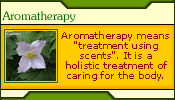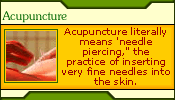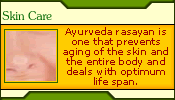|
Vaginal Dryness
Homeopaths treat the menopausal symptoms by constitutional treatment.
This is the process by which a homeopathic physician selects and
administers a woman's own constitutional remedy based on the totality
of her symptoms and her physical, mental and emotional state. This
strengthen the body's vital defenses and restore a healthy balance
and sense of well-being. Most of the major homeopathic remedies
may be used for the symptoms of menopause.
Homeopaths generally avoid giving multiple remedies simultaneously.
A second dose is not to be used until the first has ceased to act.
Once the body begins to heal, no more remedies are given or should
be taken.
Consult a homeopathic physician to determine appropriate remedy
for you as each case is different.
Homeopathic Remedies for Menopausal Discomforts
- Bellis perennis, which is indicated when the woman is
frequently tired and has a constant backache.
- Cimicifuga racemosa, which is indicated when the woman
is very talkative and restless. Her emotions may owing from troubled
to happy, and she may be fearful of disease or death. She often
has headaches and a feeling of doom centered in her stomach.
- Sanguinaria, which is indicated when the right side of
the body is more troubled than the left. The woman suffers from
itching all over her body, heavy vaginal discharge, sore breasts
and headaches on the right side of her head.
- Sepia, which is indicated when the woman is worn out
and weak. She is likely to be sad and to display indifference
to her job or family. She feels cold, despite flushing often.
She shies away from intercourse because it is difficult or painful
for her.
Amyl Nitrosum
Belladonna
Cactus Grandiflorus.
Caulophyllum
Gelsemium. Glonoine
Ignatia
Kali Carbonicum
Kreosotum.
Lachesis
Murex
Nux Moschata
Nux Vomica
Oophorinum
Pulsatilla
Sulphur
Ustilago
Maydis
Zincum Valerianum.
Depression, Nerves, Irritability
- Aconitum napellus, which is indicated for physical and
mental restlessness; sleeplessness with tossing and turning and
nightmares; and for the after effects of fright. The woman feel
anxious and fearful. She feels better after resting or being outside,
but worse at night or when lying on her left side.
- Arum Metallicum for depression accompanied by recurring
thoughts of suicide and feelings of being unloved.
Belladonna, for excitability, restlessness and mental hyperactivity.
Symptoms better in darkness, quiet, resting, sitting up and worse
in light, noise, cold air.
- Chamomilla, for hypersensitivity to pain with irritability;
inconsolable; sleepiness during the day and insomnia in the evening.
Symptoms are relieved by heat and riding in a car and worse when
angered.
- Gelsemium Sempervirens, for apprehension and exhaustion.
Symptoms seem better after urination, sweating, shaking, reclining
with head high, but worse after emotionalism, smoking, or when
in humid environment.
- Ignatia Amara, for emotional stress; sighing; nervousness;
in effects of grief. Symptoms seem improved by swallowing, eating,
and urination and worse with emotionalism, smoking, touch, and
worry.
- Lachesis Mutus, is indicated when the woman is talkative,
suspicious, thin and moody. She prefers to be by herself and may
be especially depressed in the morning. Symptoms are better in
the open air and after outbursts, but worse during and after sleep,
in warmth and in the sunlight.
- Nux Vomica, for irritability, anger, impatience; hyper
excitability and sensitivity; excessive fault finding. Symptoms
improve after naps and outbursts, but are worse in early morning,
drafts, or after alcohol, coffee, or slight disturbances.
- Passiflora Incarnata, for calming and soothing the nervous
system.
- Septa, for a tendency to depression with feelings of
wanting to with- draw from the world and everyone in it; uninterested
in sex; irritable. Symptoms seem better after strenuous exercise,
crossing legs, and after sleep and worse after getting wet, in
cold air, with anger, and before your period.
- Stramonium, for anger, irritability with many fears.
Symptoms improve with light and warmth, worsen with darkness.
- Viburnum Opulus, for excitability and restless sleep.
Improvement of symptoms occur with rest, applied pressure, and
open air, but worsen before menses, with fright, jarring, or in
a closed room.
Anxiety
- Arsenicum album, which is indicated when the woman is
cool, restless and has fears of great disease or death. She is
fault- finding and demanding. Even minimal activity tires her
out. Symptoms are worse when she is cold, during wet weather and
late at night. Heat makes her feel better.
- Borax, which is indicated when the woman is nervous and
annoyed by sudden noises or activity. She may become nauseated
by excessive anxiety, and hot flashes may keep her awake at night.
Noise, warm weather and downward motion increase her symptoms,
while pressure and cold water decrease them.
Emotions
- Chamomilla, for hypersensitivity to pain with irritability;
inconsolable; sleepiness during the day and insomnia in the evening.
Symptoms are made better by heat and riding in a car, and worse
when angered.
- Ignatia Amara, for emotional stress; sighing; nervousness;
ill effects of grief. Symptoms seem improved by swallowing, eating,
and urination and worse with emotionalism, smoking, touch, and
worry.
- Pulsatilla, for moodiness, sadness with craving for consolation;
especially helps the person whose nature is generally changeable,
with a tendency to be weepy.
- Stramonium, for anger, irritability with many fears;
nocturnal fear. Symptoms improve with light and warmth, worsen
with darkness.
Hot Flashes And Night Sweats
- Sepia is good for hot flashes which leave you nauseated,
worn out, weak, and depressed.
- Lachesis Mutus is another remedy for hot flashes, especially
if they seem to originate at the top of your head. Symptoms are
better in the open air and after outbursts, but worse before and
after sleep, in warmth and in the sunlight.
- Pulsatilla for hot flashes whose symptoms occur more
when you're indoors, leave you chilled, and emotional.
Belladonna will aid flashes that concentrate on your face and
you feel irritated and restless; there may be palpitations.
- Valeriana aids hot flashes accompanied by profuse sweating
and which are centered on your face.
- Ferrum Metallicum is good for relieving sudden hot flashes
and exhaustion.
Other applicable homeopathic preparations for hot flashes:
Use only one at a time.
Amyl Nitrosum
Sanguinaria
Cimicifuga Racemosaic
Aconitum Napellus
Glonoine
Ignatia
Manganum Aceticum
Sulphur
Sumbul
Ustilago Maydis.
Night Sweats
Nux Vomica, for night sweats that leave you chilled and irritable.
Sulphur is good for night sweats that make you extremely
thirsty and heat sensitive.
Insomnia
Do not try more than one remedy at a time. Consult a homeopathic
physician before attempting any remedies.
- Aconitum Napellus, for physical and mental restlessness;
sleeplessness with tossing and turning and nightmares; and for
the after effects of fright. Symptoms worse at night, better after
sweating.
- Arsenicum album, which is indicated when the woman is
chilly and frightened of dying. She tends to wake up in the middle
of the night and restlessly walks around the house.
Belladonna, for insomnia, excitability, restlessness and mental
hyperactivity.
- Chamomilla, for hypersensitivity to pain with irritability;
inconsolable; sleepiness during the day and insomnia in the evening.
Symptoms better with heat and riding in a car and worse when angered.
- Coffea crude, which is indicated when the woman is filled
with thoughts and ideas, her emotions swinging. She is sensitive
to noise and can't stop thinking about things.
- Lycopodium clavatum, which is indicated when the woman
is physically weak but has a sharp mind. Although lacking in self-confidence,
she tends to 'rise to the occasion.' She tends to wake up in the
very early morning and can't stop thinking about things long enough
to get back to sleep.
Passiflora Incarnata, for insomnia, calming and soothing the nervous
system
- Sulphur, which is indicated when the woman is depressed,
weak and lazy. She tends to argue and grumble a lot and suffer
from recurring symptoms. She is a very light sleeper, often awakened
by small noises.
- Viburnum Opulus, for restless sleep. Improvement of symptoms
occurs with rest, applied pressure, and open air, but worsen before
menses, with fright, jarring, or in a closed room.
|













